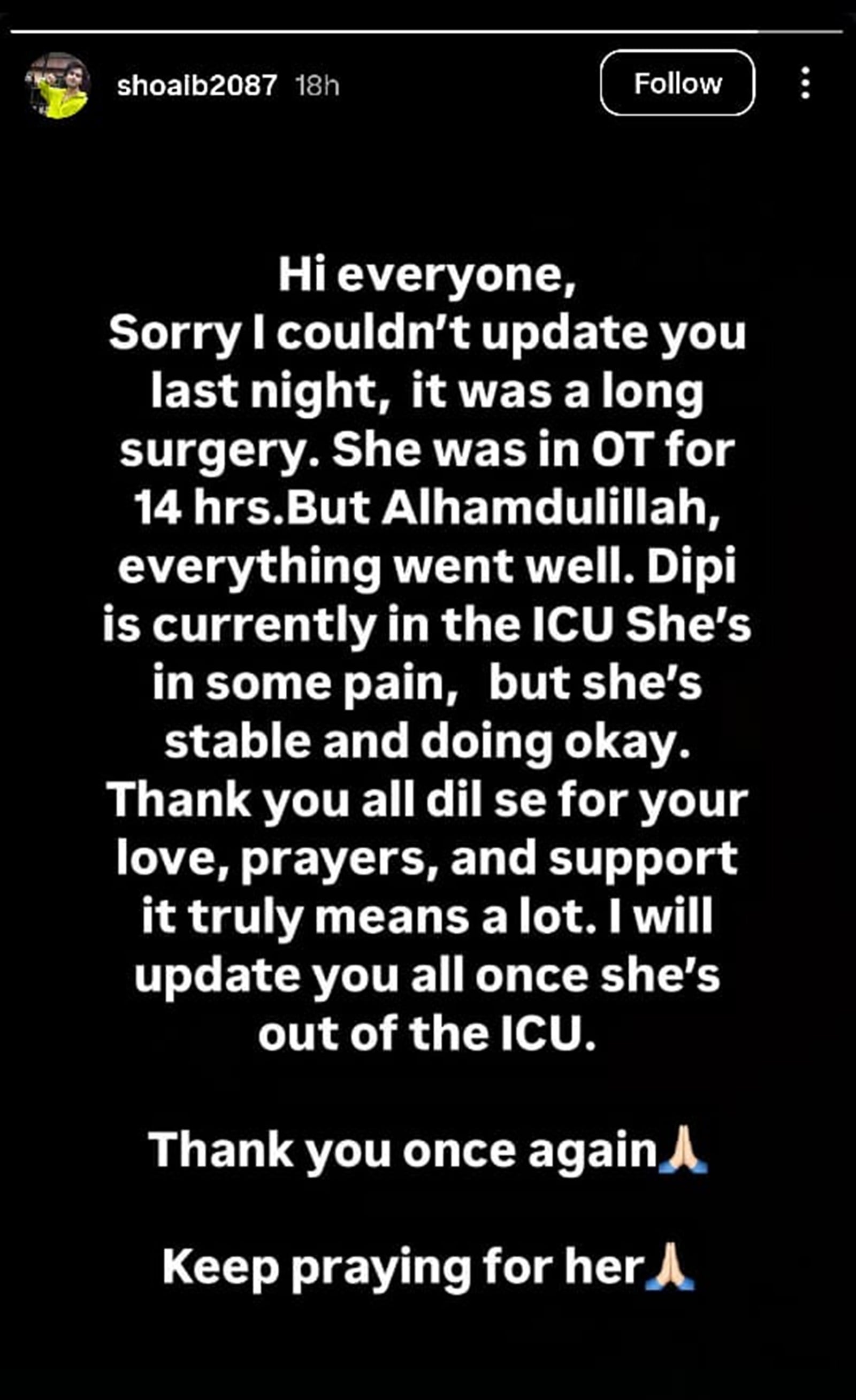When Dipika Kakar walked into a hospital complaining of upper abdominal pain, neither she nor her family anticipated the life-altering diagnosis that would follow.
The television actor was told she had a tennis ball-sized tumour in her liver, which was later confirmed to be malignant — stage two liver cancer. On May 27, Dipika wrote on Instagram: “As you all are aware, the last few weeks have been quite difficult for us… walking into the hospital for pain in the upper area of my stomach… and then finding out it’s a tennis ball-sized tumour in the liver… and then finding out that the tumour is second-stage malignant (cancerous)… it has been one of the most difficult times we have seen (sic).”
Following a delay due to a bout of flu, Dipika underwent surgery, which lasted 14 hours. Her husband, actor Shoaib Ibrahim, took to social media to update well-wishers on her condition. “Hi everyone, Sorry I couldn’t update you last night, it was a long surgery. She was in OT for 14 hrs. But Alhamdulillah, everything went well. Dipi is currently in the ICU. She’s in some pain, but she’s stable and doing okay. Thank you all dil se (from my heart) for your love, prayers, and support, it truly means a lot. I will update you all once she’s out of the ICU,” he wrote.
The couple had earlier shared that doctors had to postpone the procedure until Dipika recovered from the flu and pain caused by a gallbladder stone.
Immediate post-operative challenges a patient might face while in the ICU
Dr Pranav Honnavara Srinivasan, consultant surgical gastroenterologist at Fortis Hospitals, tells indianexpress.com, “After an extensive liver surgery lasting over 10 hours, close monitoring in the ICU becomes essential. The liver plays a central role in metabolism, detoxification, and blood clotting, so the body undergoes a significant adjustment period post-surgery. Key concerns include managing pain, preventing infections, and stabilising liver function.”

 Dipika’s husband Shoaib posted an update after the surgery (Source: Instagram/Shoaib Ibrahim)
Dipika’s husband Shoaib posted an update after the surgery (Source: Instagram/Shoaib Ibrahim)
There is also the risk of bleeding, bile leakage, or temporary liver insufficiency, depending on how much of the liver was removed. “Fluid and electrolyte balance, respiratory function, and cardiovascular stability are closely monitored. The goal in the ICU is to support all major organs while the liver begins its regeneration process,” Dr Srinivasan adds.
How can recovery be impacted if a patient has other conditions, such as gallbladder stones or recent flu?
Dr Srinivasan notes that a recent flu or respiratory infection can increase the risk of post-operative lung complications such as pneumonia. It also weakens the immune system, which is not ideal before a major surgery. “That’s why doctors prefer ensuring that the patient is as medically stable as possible before such operations. Recovery in these situations may take longer, and the medical team may need to provide more intensive support,” he explains.
Story continues below this ad
Crucial lifestyle changes or follow-up care steps that patients and families need to focus on
Dr Srinivasan says, “Patients are typically advised to follow a high-protein, low-fat diet that supports tissue repair and liver regeneration, while avoiding alcohol and processed foods. Regular follow-up with the surgical and medical gastroenterologists is critical to monitor for signs of recurrence or complications. Imaging scans, liver function tests, and sometimes tumour marker monitoring are part of the protocol.”
Physical activity is introduced gradually, Dr Srinivasan notes, starting with walking and breathing exercises to improve circulation and lung health. Mental health support is also important, as patients can experience anxiety or fatigue post-operatively. Family members play a significant role in maintaining a stress-free recovery environment, ensuring medication compliance, and helping with basic needs during the initial weeks.
DISCLAIMER: This article is based on information from the public domain and/or the experts we spoke to. Always consult your health practitioner before starting any routine.


